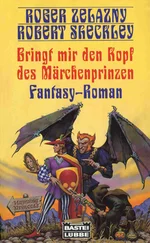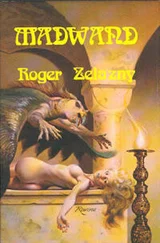Roger Zelazny - If at Faust You Don't Succeed
Здесь есть возможность читать онлайн «Roger Zelazny - If at Faust You Don't Succeed» весь текст электронной книги совершенно бесплатно (целиком полную версию без сокращений). В некоторых случаях можно слушать аудио, скачать через торрент в формате fb2 и присутствует краткое содержание. ISBN: , Жанр: Фантастика и фэнтези, на английском языке. Описание произведения, (предисловие) а так же отзывы посетителей доступны на портале библиотеки ЛибКат.
- Название:If at Faust You Don't Succeed
- Автор:
- Жанр:
- Год:неизвестен
- ISBN:0-553-56548-6
- Рейтинг книги:4 / 5. Голосов: 1
-
Избранное:Добавить в избранное
- Отзывы:
-
Ваша оценка:
- 80
- 1
- 2
- 3
- 4
- 5
If at Faust You Don't Succeed: краткое содержание, описание и аннотация
Предлагаем к чтению аннотацию, описание, краткое содержание или предисловие (зависит от того, что написал сам автор книги «If at Faust You Don't Succeed»). Если вы не нашли необходимую информацию о книге — напишите в комментариях, мы постараемся отыскать её.
If at Faust You Don't Succeed — читать онлайн бесплатно полную книгу (весь текст) целиком
Ниже представлен текст книги, разбитый по страницам. Система сохранения места последней прочитанной страницы, позволяет с удобством читать онлайн бесплатно книгу «If at Faust You Don't Succeed», без необходимости каждый раз заново искать на чём Вы остановились. Поставьте закладку, и сможете в любой момент перейти на страницу, на которой закончили чтение.
Интервал:
Закладка:
"All right," Azzie said. "I'll get rid of her. But it was worth a try." He made a series of hand movements, of a dexterity that Faust had to admire: magicians know each other's skills and excellence by the sinuosity of their hand and finger movements. Azzie's was second to none.
The light shimmered for a moment around Helen, who had been waiting rather passively through all this.
But then the shimmering went away. Azzie made passes again. This time there wasn't even a shimmer.
"Well, isn't that weird?" Azzie said. "Usually that Disappearing Spell works just fine. I'll have to look it up again later, when I have time. Tell you what. Helen's a nice girl and she needs a little vacation from Hades, where she currently resides. How about if she sticks around with you a while, and I'll take her back later?"
"Don't you worry about her," Azzie said. "She'll come to no harm. And anyway, I could tell that she wasn't right for you."
"You really think that?" Faust asked.
"Trust me. A demon knows by the glow in his chest when a love match is doomed to destruction. I'll catch up with you later, we'll have another talk. You're sure I can't tempt you with something?"
"No, but thanks for trying."
"Right, then. I must be off."
"Wait!" Faust said. "Could you supply me with a few ingredients that I need for my Traveling Spell?
Otherwise Helen and I might be stuck on this mountaintop for quite some time."
"Good thing you mentioned it," Azzie said. And, opening the pouch that all demons carry with them, but which, because of witchcraft, does not make a bulge in their clothing, Azzie removed a variety of herbs, simples, nostrums, purified metals, recondite poisons and the like, and gave these to Faust.
"Thank you," Faust said. "With these at my disposal I'll work my own destiny. Your offer was kind, Azzie, but I can take care of this matter of the impostor by myself."
"Farewell, then!" Azzie cried.
"Farewell," Faust said.
They both struck a pose, right arms upraised in the air, palms outward, thumbs folded in—the magician's gesture—then Azzie vanished in a flash and Faust, a moment later, accompanied by Helen, vanished in one also.
CHAPTER 7
Marguerite couldn't believe it. She had always heard that magicians were a fickle lot, but this, in the old German expression, really took the apple kuchen. She had gone from a tavern in Cracow to a cell in Constantinople, and she didn't even know what she'd been arrested for. And here she was, abandoned by Faust and probably in a lot of trouble. She paced up and down the cell, then cowered back as she heard the sound of heavy footsteps marching down the passageway. The footsteps stopped, the door to the next cell clanged open.
Marguerite waited, listening. There was a brief pause. Then the steps started up again. They stopped in front of her cell. She heard the sound of a key rattling in the crude lock. Then the lock turned. She cowered as the door to her cell swung open.
Then Mack, for such it was, said, "Who are you?"
"I am Marguerite," the girl said. "And you?"
"Dr. Johann Faust, at your service."
Marguerite blinked twice, and it was on her mind to say that he couldn't be Faust because the real Faust had just abandoned her to go off joyriding with a demon. But a moment's reflection convinced her that this line of talk might not be a good idea, since this fellow presumably had rescue in mind, and might not care to be contradicted so vehemently at the very beginning of their relationship. Let him be Faust, or Schmaust, or Gnaust, or whatever he pleased, so long as he got her out of here.
"What are you doing here?" Mack asked.
"That's a long story," Marguerite said. "I was with this other fellow, and, well, he sort of went off and left me here. And you?"
Mack had come to the prison cell in pursuit of Henry Dandolo, hoping to get from him the icon of St.
Basil, because this, it seemed to him, was very much what he needed to bring this situation to a successful conclusion. When he reached the first cell he saw that Dandolo, along with blind old Isaac, had left. He was about to leave himself, when some presentiment made him look into the next cell. It was strange: it was not his usual way, to look into cells. But this time it had seemed quite urgent that he do so. And so he had done it. But how to tell all this to Marguerite?
"Mine's a long story, too," he told her. "Do you want to get out of here?"
"Does a pig like to wallow?" Marguerite said, using an old expression which was common in the part of Germany where she had been a goosegirl.
"Come, then," Mack said. "Stick with me. I have to find somebody."
They left the dungeon and went out into the camp. It was a scene of confusion and riot. A thousand torches flared, illuminating people scurrying back and forth. Trumpets were blasting, and most people were moving in the direction of the city walls. It seemed that an attack was in progress.
Mack and Marguerite made their way through the crowd, walking in the direction most of the people were going. Everybody was hurrying toward the walls of Constantinople, and it seemed there was fighting going on there. Bloodied men were being helped back from the fray, many of them stuck with Byzantine arrows, which could be distinguished from others by the red and green hexagonal patterns painted on their shafts, and by their feathers, which were of Muscovy duck rather than English goose.
Other soldiers pushed past them to get into the fight. There were signs of struggle on the high battlements.
But below, with a sudden clang, the great gates that guarded Constantinople swung open, unbolted by Frankish sympathizers within the city. The mounted Crusaders, seeing this, quickly formed up and galloped toward the open gates in an armored wedge. There were Greek soldiers barring the entrance, and there were Northmen, too, who had been enlisted to fight in the city's armies. They tried vainly to stem the tide. But the maddened Crusaders slammed into them, battle-axes and maces swept through the air in short, sharp arcs, and there were cruel sounds as, with terrible effect, they landed on bodies. A
group of Greek women atop the wall had brought up a huge cauldron of boiling oil. They tipped it over now, and it came down in a sizzling gold en cascade. Frankish soldiers caught in the flood screamed as the hot oil poured over their armor and came through the neck and arm openings, to broil them inside like so many lobsters. Then a flight of arrows swept the women away, and the Frankish host was charging again, shouting their battle cries and advancing into the city with irresistible force. A small group of Turkish mercenaries were now the only ones left guarding the inner keep. Their arrows flew hard and fast, darkening the sky, making conversation difficult with the ominous hiss of their passage. Rank after rank of Crusaders were thrown down, rolling away from horses that bristled like porcupines as the Turkish arrow storm struck home. Then the tide of maddened Franks reached the ranks of the Turks, who, small of stature and lightly armored, could not stand up to the big, hairy, unshaven European men in their heavy mail. There was a great lopping of limbs and beating in of heads, and the blood-maddened Franks burst through the Turkish lines into the city streets.
Mack ran up, ducking under the sword, and, clutching Dandolo's arm, said, "Henry, it's me, Faust! Let me guide you!"
"Ah, the messenger from Green Beard!" Dandolo said. "Yes, fine, just point me in the direction of the enemy and give me a push."
"I'll do that," Mack said, and turned Henry around so that he faced the city walk. As he did so, he deftly removed Dandolo's silken sling, from which he had seen, peeking, the icon of St. Basil.
"Best of luck, sir!" he called out, and Henry Dandolo waved his sword and went charging into the battle, a precursor of Don Quixote if there ever was one.
Читать дальшеИнтервал:
Закладка:
Похожие книги на «If at Faust You Don't Succeed»
Представляем Вашему вниманию похожие книги на «If at Faust You Don't Succeed» списком для выбора. Мы отобрали схожую по названию и смыслу литературу в надежде предоставить читателям больше вариантов отыскать новые, интересные, ещё непрочитанные произведения.
Обсуждение, отзывы о книге «If at Faust You Don't Succeed» и просто собственные мнения читателей. Оставьте ваши комментарии, напишите, что Вы думаете о произведении, его смысле или главных героях. Укажите что конкретно понравилось, а что нет, и почему Вы так считаете.




